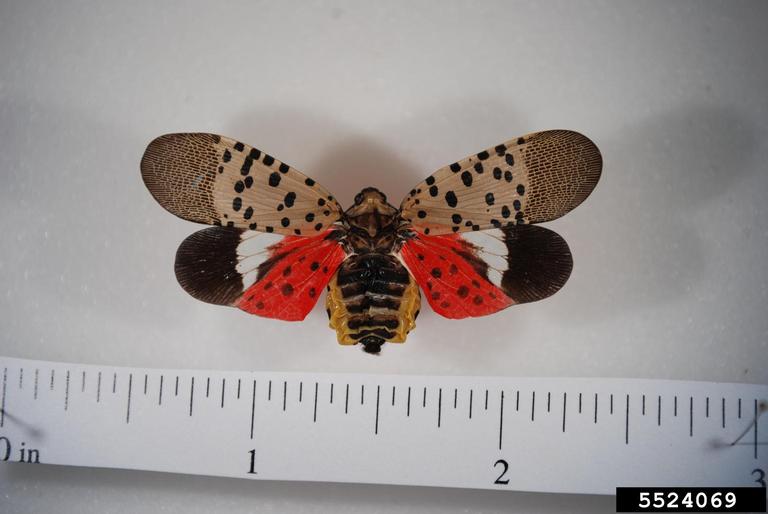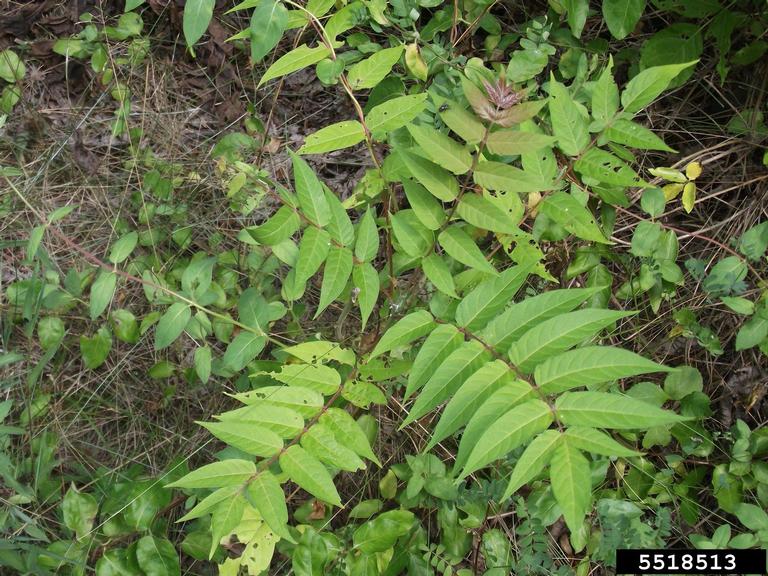Tree of Heaven

Tree of Heaven
(Ailanthus altissima)
Priority: - Contain / Annual Control
Identification and Reproduction
Identification:
- Deciduous tree with pinnately compound leaves
- Up to 41 oval shaped leaflets on central leaf steam, leaflets 5 to 25 cm long with smooth edges
- Leaves up to 1 m in lenght
- Small flowers, ranging in colour from white or pale yellow to green
- Single seeded fruits of 3 to 5 cm in lenght, winged and often twisted samara, red in colour
- Grey to brown thin bark
- Grows up to 30 m in height, 10 to 15 m wide
Photo Credit: Richard Gardner
This plant may be confused for:
Reproduction:
Tree of Heaven
- Reproduces by seeds, root suckering and resprouting
- Females produce more than 300,000 seeds each year
- New sprouts can extend up to 50 ft away from parent tree
Habitat & Ecology
- Will sprout and establish nearly anywhere
- Tolerates a wide range of environmental conditions
- Commonly found in cities, along roads and rivers, in agricultural fields, forests
Impacts
Social:
- Foul smelling when plant parts crushed
- Damages infrastructure including sewers, foundations and sidewalks via the strong and powerful root system
- Can cause allergic reactions in some people, sap and plant parts may cause irritation of skin
Ecological:
- Outcompetes and crowds out native vegetation
- Dominates sites once established
- Produces allelopathic chemicals that prevents growth of other vegetation
- Prefered host of choice of the Spotted Lanternfly, an invasive insect in North America

Spotted Lanternfly- photo credit: Pennsylvania Department of Agriculture, Bugwood.org
Management
All management methods should focus on roots for best success
Mechanical/Manual: (NOT RECOMMENDED)
- Mowing or cutting ineffective, will cause more growth of sprouts and root suckers
- Hand pulling of young seedling possible, must removal entire root system
Chemical:
- Apply systemic herbicide at optimal time of year (July through September) in order to effectively control roots
- 30 days after chemical control, cut the tree
- Use herbicides containing the active ingredients Glyphosate or Triclopyr
- Various application methods
- Foliar application: good for initial treatment of area to eliminate small, low growth of Tree of Heaven saplings
- Basal bark: good for trees up to 6 inches in diameter, apply herbicide solution around stem from ground to a height of 12 inches
- Cut and paint: good for trees larger than 1 inch in diameter, create downward angle cuts around trunk and apply herbicide solution in the cuts
- Always follow herbicide label instructions!
Resources
For information on the Tree of Heaven, management methods and it's look-alikes click here (PennState Extension) or here (Washington State Noxious Weed Control Board).
For detailed information on management of the Tree of Heaven, click here.
For further information on the Tree of Heaven and control, visit the USDA Forest Service.
For more information on the Tree of Heaven and further resources please visit the Invasive Species Centre.
City of Vancouver, WA Guide to Invasive Trees.
Header Photo (Josepgesti)




